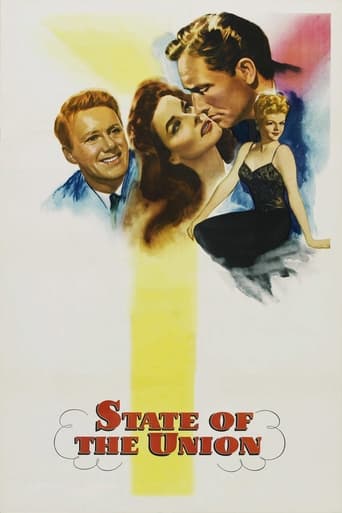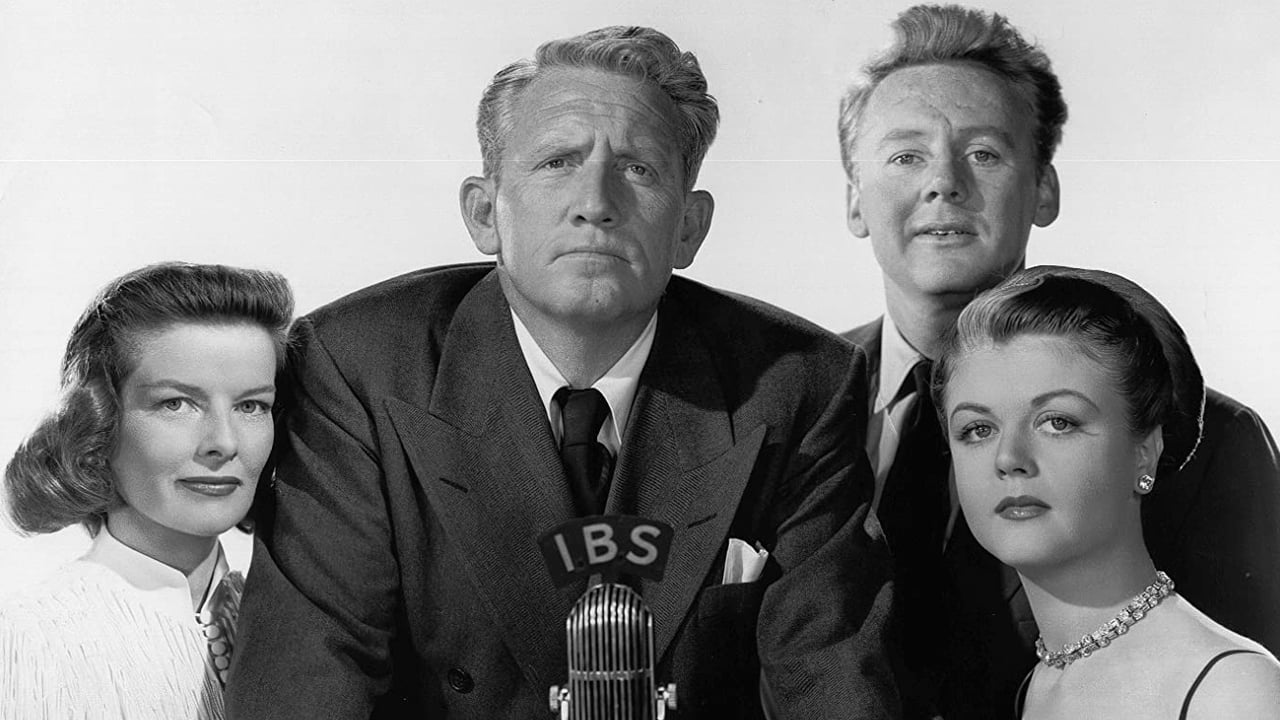HotToastyRag
When State of the Union started, I was at the edge of my seat. Angela Lansbury, newspaper tycoon, has handpicked the next Republican candidate for president, and she sells the idea to Adolphe Menjou, a top political adviser, and Van Johnson, a campaign manager. The man she wants has no political background. He's a successful businessman and a millionaire, and he connects with the common man because he's not a typical politician. Sound familiar? Here's the even better part: It turns out Angela is having an affair with the candidate, and when his wife shows up to squelch infidelity rumors and promote a good family image, Angela sneaks into their bedroom and places her reading glasses on the nightstand, knowing the wife will find and question them. Exciting, isn't it? Well, that's as exciting as it gets. The rest of the film tries to show the dirtiness of politics, but to anyone who's ever paid attention to the political realm, it doesn't even scratch the surface. Spencer Tracy is cast as the likable, honest politician, but he comes across as neither. He seems angry and stupid, even though that's not how his character is written. Fredric March would have been a better casting choice, in my opinion. He pontificates and gets in his own way—and on the audience's nerves—while his wife, Katharine Hepburn pretends to argue but really always goes along with whatever the politicians tell her to do. Normally, she's a fantastic actress, but in this film, she rushes her lines and says them without much feeling. It felt like a rehearsal the actors didn't know was being filmed. She does say one funny line, though: "No woman could ever run for President. She'd have to admit to being over thirty-five!" Boring and corny to the very end, this is a movie to skip unless you're a die-hard Tracy-Hepburn fan. As for me, whenever I see them on screen together, I can't help but remember how mistreated Kate was. I don't think they're movie-magic, and I don't see sparks flying off the screen. I see an angry, arrogant man and his abused partner.DLM Warning: If you suffer from vertigo or dizzy spells, like my mom does, there's a scene in this movie that will not be your friend. When Spencer Tracy pilots his airplane, the camera swirls excessively and it will make you sick. In other words, "Don't Look, Mom!"
Michael_Elliott
State of the Union (1948) *** (out of 4) Political drama from Capra has an honest Grant Matthews (Spencer Tracy) being selected to run for President but soon his honest ways are thrown out by a newspaper woman (Angela Lansbury) and a political spinner (Adolphe Menjou). The two of them plan on riding him into the White House but his wife (Katharine Hepburn) begins to have second thoughts on what their turning her husband into. Of all the Tracy/Hepburn teamings this one here is probably the least known, which is a little bit surprising considering Capra directed it and the wonderful supporting cast but on second thought it might be understandable as this isn't the typical film that they'd appear in together. The movie features some terrific performances but a few questionable bits a comedy keep it from being a bigger hit. There were some scenes that I would have left on the cutting room floor including an extremely silly sequence where plane-tag is played. With a few more of the comedic moments edited out you would have been left with a major hit but as is this film still manages to be quite powerful. What really makes the film go is Hepburn and it's funny to learn she got the role by accident after another actress pretty much walked off after certain demands of hers couldn't be met. Hepburn steals the film from Tracy as she really digs in and gives the movie all of its heart and soul and I think the actress really should get this film mentioned more when people discuss her wonderful career. Tracy is once again Tracy meaning that he turns in the expected great performance. The supporting cast includes nice work from Lewis Stone, Van Johnson, Charles Dingle and even Carl "Alfafa" Switzer in a small role. Menjou and Lansbury are very good in their supporting roles of what would turn out to be good villains. Capra pretty much handled this type of material earlier in MR. DEEDS GOES TO TOWN and MR. SMITH GOES TO WASHINGTON but he makes it all seem fresh again here. The ending has a nice punch to it even though you'll certainly see it coming from a mile away. It's rather funny to see how political movies from the 1930s and 40s still hold up perfectly well today but then it's rather sad to see how nothing much has changed in the political world.
stphifer
This is my favorite Tracy-Hepburn film and one of my favorite Frank Capra films. I recommend reading Capra's out-of-print biography, "The Name Above the Title" for the interesting story of the reaction to this film by official Washington in 1948.Quite reminiscent of "Meet John Doe," the story tests the character of a man against the political power-brokers who want to use him for their own purposes. Ideals battle pragmatism in ways that still ring true 50+ years later.Angela Landsbury is a wicked woman (can we call her a fem fa tale?) in an amazing performance foreshadowing her role in 1962's "Manchurian Candidate." Adolphe Menjou's sleazy political boss is about a greasy as they come.All in all there is nothing like a Capra film to make me what to stick to my principles and listen to the people who really love me. Add to Capra's theme of the inherent wisdom of the people this first rate group of actors and you have two hours of time well spent.
theowinthrop
This is probably (except for WITHOUT LOVE ?) the most forgotten of the Tracy - Hepburn film parings. As has been pointed out it has not been revived that frequently, and as a result people barely remember it. But it has a terrific cast (the two leads, Angela Lansbury, Van Johnson, Adolphe Menjou, Charles Dingle, Raymond Walburn, Irving Bacon, even Carl "Alfafa" Switzer), and for all the dated references to politics in 1947 - 48, it still has amazing relevance. Therefore, if it is not up to the best Capra films of the late 1930s to IT'S A WONDERFUL LIFE, it does help lead the second tier with POCKETFUL OF MIRACLES and A HOLE IN THE HEAD.Tracy's character (as pointed out by another poster on this thread) is suggested by Wendell Wilkie. Wilkie is another figure who once loomed largely in America, but who is now as faded as old wall paper. He headed the largest privately owned utilities company in the U.S., which had to be broken up after the New Deal got underway. This was really ironic, because Wilkie was a life-long Democrat. Coming out of Indiana he had gone a long way (F.D.R.'s acid tongued Interior Secretary, Harold Ickes, referred to him - with a look towards an old poem by John Greenleaf Whittier - as "The barefoot boy from Wall Street."). Wilkie got involved in politics in the late 1930s, with respect to his suspicions about where the New Deal was headed. He turned Republican, and in 1940 surprised the nation by beating out Thomas Dewey and Senator Robert Taft for the Republican nomination for President at Philadephia. It has been pointed out that in the movie, I MARRIED A WITCH, the slogan "Win With Wilkie" is used as a reference for gubernatorial candidate Wooley (Frederic March) as "Win With Wooley". A Bugs Bunny cartoon about "gremlins" (little mechanical problems in war machines) has the "gremlin" shout that he isn't Wendell Wilkie. F.D.R. won, but his sizable victories in 1932 and 1936 were not repeated. Wilkie actually demonstrated that the Republican Party was far from dead.Unfortunately Wilkie never repeated this success politically. An independent, most of the party leaders felt he wasn't Republican enough. He took a trip around the globe to visit the battlefronts, and wrote an account ONE WORLD, which became a best seller - and helped prepare the American people for the successful creation of a United Nations. In 1944 FDR was approached by some advisers to consider Wilkie as his running mate for Vice President. Roosevelt was less than happy with the idea. In the end it did not matter - Wilkie died.Keeping that in mind, Tracy's character Grant Matthews makes sense. He is a wealthy independent person. He is married but he has extra-marital affairs (as did Wilkie, which was one of the reasons his campaign did not use FDR's affair with Lucy Mercer against him). If you recall, Tracy tells a stunned Adolphe Menjou his idea of bringing democracy to the world through a United States of the world (like Wilkie's "One World"). Tracy's relationship with Hepburn is that of a good man who has fallen into a trough in his home-life. Apparently at one point they shared a great deal, but Tracy's ego takes off when manipulated by Lansbury, as opposed to Hepburn who is more down-to-earth. It is only when she bitterly throws her own opinions aside and makes a hated speech for his campaign that he realizes how much she compromised her ideals for him, and how much he's compromised - and for what? His Presidency would owe a lot to the likes of Walburn, Dingle, and Florence Auer: a questionable Southern Republican, a crooked labor leader (who thinks John L. Lewis and William Green are anathema), and a woman's whose power base is due to prejudice against certain foreign groups. He'd also owe Menjou (more about him later) and Lansbury would expect free access to the Oval Office.The most interesting of the group is actually Menjou. One of American's best political managers he is bitter. His Connover is not a bad man (actually he is quite tolerable), but he has been shunned because of a connection he could not avoid with the "Ohio Gang" that put Warren Harding in the White House in 1920, and then stole millions (Connover didn't). He'd like to get the Chairmanship of the Republican Party to get back at his foes - not a nice thing but it is understandable. In the end he does not get too upset when plans go awry. He's kept on the payroll as a political editor for Lansbury. Actually one feels good for him.Similarly one feels good for Van Johnson. A cynic, like Lionel Stander in MR. DEEDS GOES TO TOWN, he regains his ideals observing Hepburn's reactions to the political crap, and is involved in finally turning Tracy around. Lansbury is aware of this, and fires him. He smiles with happiness to be well out of the job for her.The best moment to me in the film is a nice moment when Tracy is contemplating the run for the White House offered by Lansbury and Menjou. He stands in front of the White House next to an actor named Maurice Cass, who is only in this scene in the movie. Cass is rhapsodizing about how wonderful it is that every President since John Adams has lived in the White House. Tracy says it needs a paint job. Cass takes him to task for only seeing that. Tracy sticks to his guns about the paint job, but he lists all of the great figures who fought for freedom (including Crispus Attucks, by the way) and how the White House is their monument. At the end he and Cass go off for a drink together. A simple moment - pure Capra-corn, but really worth it.


 AD
AD





